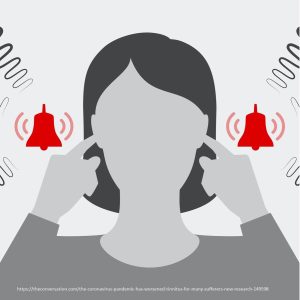The Tinnitus and Hyperacusis Clinic (THC), part of the Eckelmann-Taylor Speech and Hearing Clinic at Illinois State University, is committed to bringing specialized tinnitus care to patients while providing unique clinical experiences for students. When combined with a proper evaluation and individualized education, hearing aids can be a powerful tool for managing bothersome tinnitus for those with and without significant hearing loss.
When someone hears tinnitus, they are hearing extra brain activity. For those with hearing loss, the brain is reacting to a loss of stimulation from the ears by increasing and changing neural activity in the auditory parts of the brain. This extra activity is heard as a ring, hum, buzz, or other sound. According to a recent MarkeTrak VIII survey, nearly two out of three respondents found that hearing aids relieved their tinnitus “most of the time” or “all of the time.”
For those with hearing loss, the hearing aids are helpful in a few ways. Hearing aids will improve/restore stimulation to the brain which may calm tinnitus. They allow environmental sounds to be heard more appropriately which may naturally mask the tinnitus and can be used for sound therapy (more on this below). Also, improved hearing can reduce stress and listening fatigue, which are often factors that exacerbate tinnitus. If you have hearing loss and tinnitus, a carefully selected and well-fit hearing aid should be considered.
Even those with bothersome tinnitus and normal hearing can often benefit from using a hearing aid for sound therapy. When tinnitus is severe, particularly when it is disrupting daily activities, constant sound therapy is recommended. Sound therapy is avoiding silence and aiming to always be in some type of sound to reduce tinnitus awareness and annoyance and train the brain over time to ignore the tinnitus. While this can be accomplished with non-hearing aid headphones and speakers, these options can block off natural hearing making it difficult to communicate and function. If constant sound therapy is needed, a hearing aid can provide access to a variety of high-quality sounds, both internal and via Bluetooth streaming, while maintaining natural hearing. This makes the goal of constant sound therapy an easy one to achieve.
If you experience tinnitus, you are welcome to set up an appointment at the Eckelmann-Taylor Speech and Hearing Clinic at Illinois State where high-quality clinicians can support you in decreasing the impact tinnitus has on your everyday life.


